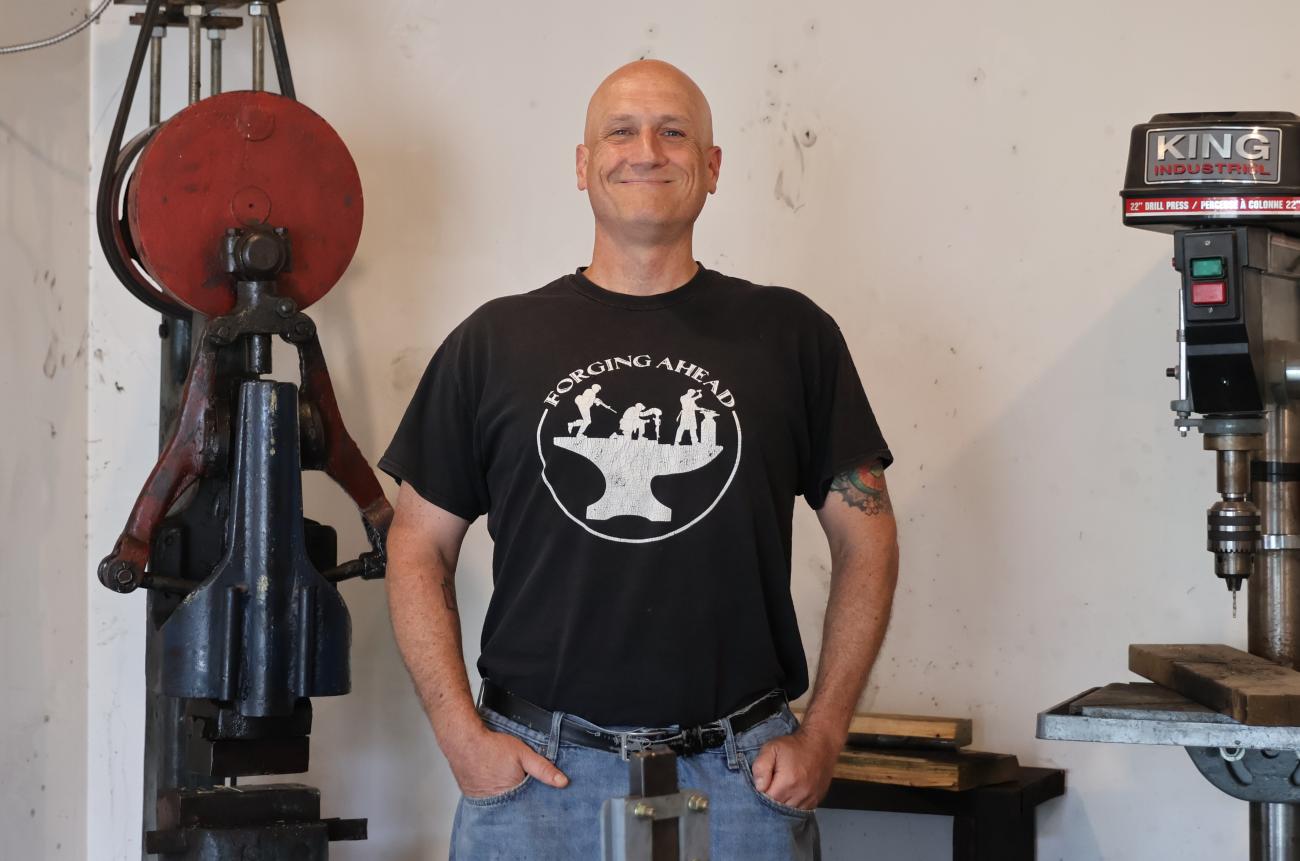St. Adolphe is home to a small backyard shop run by a smalltown blacksmith, but the proprietor dreams in ways that are anything but small.
Cameron Bennett is the brainchild and driving force behind Forging Ahead Inc., a nonprofit whose goal is to help PTSD sufferers find therapeutic and creative ways to manage their traumatic stress.
Bennett is a veteran of the Canadian military, having served for two decades as a peacekeeper in places like Yugoslavia and Afghanistan before being released in 2018 with PTSD.
Sometime later, Bennett discovered blacksmithing and has since made it his mission to help others in the same way he’s been helped.
On May 30, Bennett was joined by a contingent of prominent Manitoba leaders for a firsthand look at what his organization is all about. Attendees included MP Ted Falk and MLAs David Pankratz, Billie Cross, Shannon Corbet, and Robert Loiselle. Loiselle has worked as a blacksmith at Lower Fort Garry.
Bennett took advantage of their visit to his shop on Hebert Road by pitching an idea for which his passion runs deep.
“I told them I’ve taken this as far as I can,” Bennett says. “I know we can keep doing it like this with the sponsors around here, but we can’t get it to the next level until we get more influence and more connections. Just imagine what we could do with provincial healthcare support.”
Without government funding, he told them, his homespun charity, which runs on local support, will have limited reach among the thousands of PTSD sufferers out there.
But it’s not just the ears of Manitoba politicians that are perking up. In recent months, Bennett has garnered the attention of a researcher at University of Toronto, Linna Tam-Seto, who has developed a mentorship program for women in the Canadian Armed Forces suffering from the effects of military sexual trauma.
Tam-Seto is a faculty member of the Families Matter Research Group, working towards the betterment of the health and wellbeing of security and defence families.
According to Bennett, when Tam-Seto reached out to him she asked to collaborate with him on research she’s hoping to conduct on helping PTSD sufferers effectively transition back into society.
Pending funding approval, the research is expected to get underway this fall.
Bennett and Tam-Seto will also attend an international convention in October where researchers from around the world will converge to network and share their ideas.
Bennett has been asked to speak.
His message won’t focus solely on the therapeutic benefits of blacksmithing. This specific art holds no special magic when it comes to managing PTSD. He believes, though, that there is an art or hands-on skill out there that could offer life-saving benefits for almost all of those afflicted with this stress-related disorder.
“These are ways that a lot of veterans and first responders find a sense of peace and calm,” Bennett says. “The arts offer a sense of control… a sense of job accomplishment and problem-solving skills.”
What these quiet skills don’t do, he says, is activate all the negative triggers that keep PTSD sufferers spiralling.
Should Tam-Seto receive the green light to carry out her research, Bennett is hopeful that her findings will in turn kickstart a movement toward creative art therapy in medicine across the country.
“Mental health [struggles] are, in my opinion, the biggest problem coming in the future, so we need to get ahead of it now,” Bennett says. “Especially with new funding for the military coming. That means they’re going to have more [veterans] coming out with mental health problems.”
The type of mental health centre that Bennett dreams of would look similar to the Haliburton School of Art and Design in Ontario, where he trained to become a certified blacksmith.
Unlike Haliburton, Bennet’s would run as a charity, allowing users of all economic backgrounds to access it.
Ideally, the school would offer degrees in many disciplines, including painting, sculpting, woodworking, stone masonry, and blacksmithing. It may even include wilderness survival skills.
Bennett sees Niverville as the prime location for just such a facility.
But the facility would offer far more than just a school. There would be a full range of wraparound services onsite, such as psychologists and social workers. On the grounds, special focal points could be developed where mindfulness, yoga, and meditation practices are encouraged.
“Then we can talk to Homes for Heroes [Foundation],” says Bennett. “You could have apartments for veterans to stay and get long-term care. [This would be] a Canada-first. The first centre for preventative mental health care.”
Of course, such a facility would provide a certain economic spinoff for the community as well. A gift shop or farmer’s market onsite would draw in shoppers looking for unique quality handmade items. And income derived from these sales would not only benefit the artist but also help the facility, further subsidizing classes for future students.
The icing on the cake, for Bennett, would be to build a nearby park where statues or cairns, created by the craftspeople, would be erected, telling the history of Canada’s military and first responders and breaking down the stigma of PTSD.
It’s forward-thinking from the perspective of a healthcare system that currently treats mental health issues with revolving door services with questionable efficacy. Most often these services only become available when the sufferer reaches a breaking point, such as through drug addiction or suicidal ideation.
Bennett wants to see a medical system that offers preventative services to keep sufferers from getting to that point in the first place.
“This is the stopgap in the mental health system that is missing,” he says. “This would be there to help them recover and give them hope again.”


